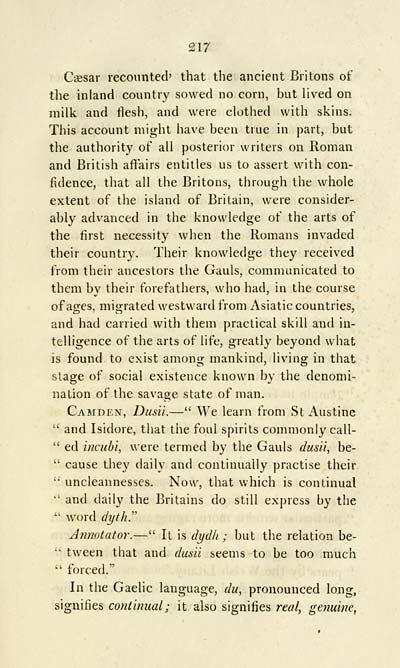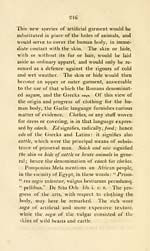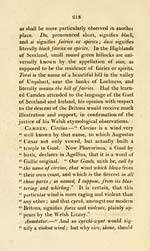Download files
Complete book:
Individual page:
Thumbnail gallery: Grid view | List view

217
Ciesar recounted' that the ancient Britons ot"
the inland country sowed no corn, but lived on
milk and flesh, and were clothed with skins.
This account might have been true in part, but
the authority of all posterior writers on Roman
and British affairs entitles us to assert with con-
fidence, that all the Britons, through the whole
extent of the island of Britain, were consider-
ably advanced in the knowledge of the arts of
the first necessity when the Romans invaded
their countr3^ Their knowledge they received
from their ancestors the Gauls, communicated to
them by their forefathers, who had, in the course
of ages, migrated westward from Asiatic countries,
and had carried with them practical skill and in-
telligence of the arts of life, greatly beyond what
is found to exist among mankind, living in that
stage of social existence known by the denomi-
nation of the savage state of man.
Camden, Dusii. — " We learn from St Austine
" and Isidore, that the foul spirits commonly call-
" ed inaibi, were termed by the Gauls dusii, be-
" cause they daily and continually practise their
" uncleannesses. Now, that which is continual
'' and daily the Britains do still express by the
" word dythr
Amiotator. — " It is dydli ; but the relation be-
" tween that and dusii seems to be too much
" forced."
In the Gaelic language, du, pronounced long,
signifies continual; it also signifies real, ge?iuine,
Ciesar recounted' that the ancient Britons ot"
the inland country sowed no corn, but lived on
milk and flesh, and were clothed with skins.
This account might have been true in part, but
the authority of all posterior writers on Roman
and British affairs entitles us to assert with con-
fidence, that all the Britons, through the whole
extent of the island of Britain, were consider-
ably advanced in the knowledge of the arts of
the first necessity when the Romans invaded
their countr3^ Their knowledge they received
from their ancestors the Gauls, communicated to
them by their forefathers, who had, in the course
of ages, migrated westward from Asiatic countries,
and had carried with them practical skill and in-
telligence of the arts of life, greatly beyond what
is found to exist among mankind, living in that
stage of social existence known by the denomi-
nation of the savage state of man.
Camden, Dusii. — " We learn from St Austine
" and Isidore, that the foul spirits commonly call-
" ed inaibi, were termed by the Gauls dusii, be-
" cause they daily and continually practise their
" uncleannesses. Now, that which is continual
'' and daily the Britains do still express by the
" word dythr
Amiotator. — " It is dydli ; but the relation be-
" tween that and dusii seems to be too much
" forced."
In the Gaelic language, du, pronounced long,
signifies continual; it also signifies real, ge?iuine,
Set display mode to: Large image | Transcription
Images and transcriptions on this page, including medium image downloads, may be used under the Creative Commons Attribution 4.0 International Licence unless otherwise stated. ![]()
| Early Gaelic Book Collections > Ossian Collection > Thoughts on the origin and descent of the Gael > (229) |
|---|
| Permanent URL | https://digital.nls.uk/82237192 |
|---|
| Description | Selected books from the Ossian Collection of 327 volumes, originally assembled by J. Norman Methven of Perth. Different editions and translations of James MacPherson's epic poem 'Ossian', some with a map of the 'Kingdom of Connor'. Also secondary material relating to Ossianic poetry and the Ossian controversy. |
|---|
| Description | Selected items from five 'Special and Named Printed Collections'. Includes books in Gaelic and other Celtic languages, works about the Gaels, their languages, literature, culture and history. |
|---|

